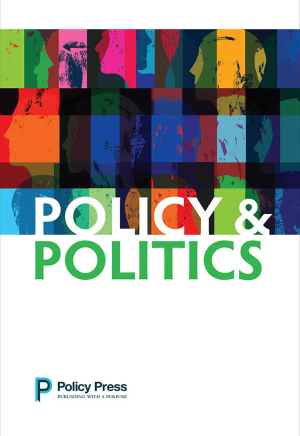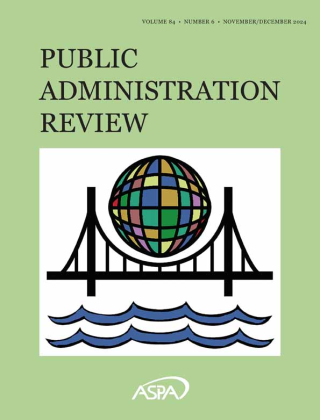-
9 Jun 2025 • Journal Article • Policy & Politics
A new measurement model and database of the democratic qualities of regulatory bodies
AbstractTransparency, accountability, participation and inclusiveness are central concepts in the literature on public administration. They are considered qualities that enable administrative bodies to share power with social and political actors and strengthen their democratic nature. These qualities have also been recognized as crucial for regulatory bodies, especially because
… show more -
11 Apr 2025 • Journal Article • Policy and Society
Environmental impact assessments as a mechanism of regulatory intermediation: the case of Israeli wind energy
AbstractThe environmental impacts of infrastructure projects are widely assessed through a procedure known as environmental impact assessments (EIAs). In many regulatory systems, EIAs are carried out by third-party intermediaries. However, their roles and effectiveness within public policy and regulatory governance remain understudied. This study addresses this gap by examining
… show more -
13 Mar 2025 • Book Chapter • Handbook on Trust in Public Governance
Trust and regulation
Abstract(Dis)trust is referred to in the literature as both an antecedent and/or a consequence of regulation and regulatory governance in terms of regulatory content, procedures, and (behavior of) actors, and vice versa. However, trust and regulation might be competing and eroding each other, substituting for or mutually reinforcing each other. The chapter first discusses
… show more -
2025 • Journal Article • Public Administration Review
A taste for government employment also rests on its political flavor
AbstractThe global experience of political polarization, and politicians' attacks on democratic institutions, render individuals' identification with the governing coalition, or with its opposition, a likely antecedent of their attraction to work in government. This article examines to what extent individuals' partisan alignment with the governing coalition, and perceptions of
… show more -
2025 • Journal Article • Governance
Relational dynamics under close supervision: Examining transnational cooperation in regulatory oversight
AbstractThe increasing institutionalization of regulatory oversight worldwide has not resulted in the creation of numerous formal channels of transnational regulatory oversight cooperation. Despite its puzzling nature, this circumstance has barely attracted scholarly attention. Additionally, the study of cooperation across transgovernmental regulatory networks with actors having
… show more -
Dec 2024 • Journal Article • International Review of Public Policy
Institutional Transformations of Global Governance – Key Challenges for International Organisations
AbstractThis article examines the evolving institutional challenges of global governance by analyzing four key sectors: trade, security, environment, and finance. Recent transformations have increased their complexity and fragmentation in these sectors, challenging the traditional dominance of intergovernmental organizations (IGOs). Based on the findings of the H2020 GLOBE
… show more -
17 Feb 2024 • Journal Article • SocArXiv
Partisan Alignment and the Propensity to Choose a Job in a Government Ministry
AbstractThe global experience of political polarization, and politicians’ attacks on democratic institutions, render individuals’ identification with the governing coalition, or with its opposition, a likely antecedent of their attraction to work for government organizations. This article examines to what extent individuals’ partisan alignmentwith the governing coalition, and
… show more -
21 Feb 2023 • Journal Article • Journal of European Public Policy
The regulatory security state as a risk state
AbstractThis paper places the arguments about the rise of the regulatory security state in a broader perspective of regulatory governance and regulatory state literatures. It suggests that the regulatory security state is one morph of the regulatory state. It does not replace any other morph and indeed it is only partly new. I clarify the terminology around the ‘old’ and new’
… show more -
20 Jan 2023 • Journal Article • Journal of Comparative Policy Analysis: Research and Practice
Self-Governance via Intermediaries: Credibility in Three Different Modes of Governance
AbstractThis article analyzes the emergence of new forms of regulatory intermediation in three different modes of governance. It compares the emergence of the European data protection and Facebook’s content moderation regimes and raises three questions: How did self-regulation in the European data protection and Facebook’s content moderation regimes evolve over time? What are
… show more -
15 Oct 2022 • Journal Article • Journal of European Public Policy
Varieties of regulatory regimes and their effect on citizens’ trust in firms
AbstractThe regulation of market activity has been largely dominated by governmental command-and-control regulatory design (C&C), which was seen as the safest way to protect the public from potential harm by firms. In recent years, in an effort to move to more relaxed and less burdensome regulation, alternative regulatory tools have been developed, tools that rely on firms
… show more
















